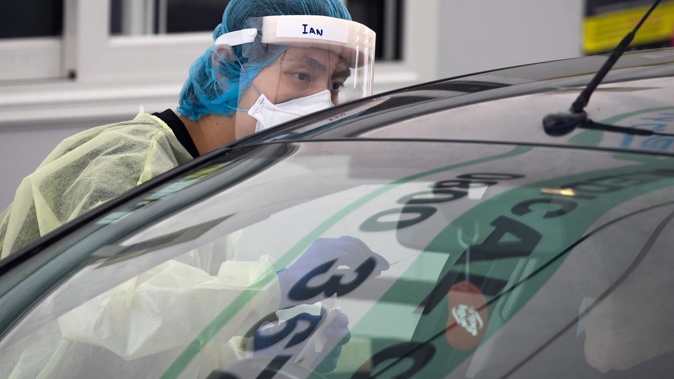
New Zealand will sadly see more deaths and severe disease from Covid, particularly among the elderly, epidemiologist Dr Rod Jackson says.
And he says he cringes when he sees daily cases hovering at around 23,000 - some modelling shows they could be four times that number, and therefore closer to 100,000.
He was commenting on a further five deaths reported yesterday, all of whom had unrelated conditions. Two patients died at Middlemore Hospital in Auckland. The other deaths occurred at Tauranga and Waikato Hospitals and in Dunedin.
That brings to 67 the number of people who have died with Covid since the outbreak started in 2020.
Jackson said most cases of Omicron so far were in younger people who were less likely to get really sick and die, but the crunch would come when more elderly people get Omicron.
"It is going to be difficult to stop it spreading and once it takes hold in older age groups, sadly, we are going to see more severe disease and more deaths," he said.
The only way to slow down Omicron among the elderly was to maximise vaccination rates, wear masks and do rapid antigen tests (RATs) before people visited retirement villages, Jackson said.
There were 22,535 new Covid-19 cases yesterday - down on Thursday's 23,183. Three per cent of New Zealand's population are currently active cases, of which there are 152,358.
Jackson said he cringed seeing the daily number of Covid cases because they gave the public a false sense of accuracy. The daily numbers were a minimum number; some modelling suggested the true number was four times as many, he said.
The Government should report an approximate number of cases each day with a caveat about their accuracy, said Jackson, saying only two numbers are now relevant and they are the number of people in hospital and the number of deaths.
The numbers come as northern region doctors plead with people who are able to manage their cold and flu symptoms at home to do so, leaving stretched hospitals and GPs for people who need them most.
There are 562 people in hospital and 11 in intensive care - 382 of those in Auckland. Seven people are in intensive care in Auckland. The average age of those needing hospital-level care is 53.
Hospitalisations were up from Thursday's figure of 503.
The regional breakdown of yesterday's cases is: 515 cases in Northland, 13,252 in Auckland, 1674 in Waikato, 1,248 in Bay of Plenty, 464 in Lakes, 325 in Hawke's Bay, 364 in MidCentral, 79 in Whanganui, 257 in Taranaki, 155 in Tairāwhiti, 69 in Wairarapa, 1356 in Capital and Coast, 577 in Hutt Valley, 304 in Nelson Marlborough,1163 in Canterbury, 63 in South Canterbury, 632 in Southern, 16 in West Coast and 14 are unknown.
Of the new community cases, 18,779 were from rapid antigen tests (RATs) and 3748 were from PCR tests.
There were eight cases at the border, one confirmed and seven deemed probable.
As hospital demand increased alongside Covid case numbers, and some staff were required to isolate at home, more demand was being put on the system, clinical immunologist and allergist Dr Anthony Jordan said.
He stressed the Omicron strain of Covid was a much milder strain of the virus and there were systems in place for those who began to feel worse.
This included establishing four care hubs in Auckland.
He apologised to anyone who was experiencing disruptions in their planned care because of the Covid-19 situation.
Jordan acknowledged the people in the health care sector who were doing their day-to-day work as well as supporting the Covid-19 response.
He asked people who were able to, to manage their cold and flu symptoms at home like they normally would, to leave hospitals and emergency departments for those who needed it most.
Primary care co-clinical lead for whānau HQ Dr Christine McIntosh said all health care for Covid-related conditions would be free.
Māori and Pasifika coordination hubs had been established, she said.
McIntosh said primary care and urgent care were feeling the pressure across the system as their practices were affected by staff shortages and case numbers increased.
McIntosh said she recognised some people might feel anxious about the high case numbers, but reminded people that Omicron was a mild illness.
However, it was important to stress that if people's symptoms became severe, such as chest pains, dizziness or difficult breathing, they should call for help by phoning 111.
Old said health officials didn't have as good of a picture of people who were taking RAT tests, compared to PCR testing.
Regarding stockpiling, there was a lot of supply in the country, Old said.
"If you don't need to get tested, then don't get tested."
"The ministry wants to reassure people that we have enough RATs to help New Zealand through a widespread Omicron outbreak in the coming months. Over the past week, 8.8 million RATs have been distributed. Over the weekend, another 8 million RATs are expected to arrive in the country, with another 99 million confirmed for delivery this month.
"So, while we are anticipating continued high demand, our request is to, please, be patient and kind to each other and staff. They are working as hard as they can," the ministry said.
The ministry said the priority for free RATs remained those who were symptomatic or a household contact.
"Please do not order or request RATs from testing centre or collections sites unless you are unwell or a household contact.
"International travel pre-departure testing is not covered under the public health response.
"If you are well, you can still purchase RATs from one of a growing number of retailers which stock them."
Old said they were working with collectives, such as the Auckland City Mission and Māori and Pacific providers, to ensure they had good access to RATs for the populations they serve.
Take your Radio, Podcasts and Music with you









